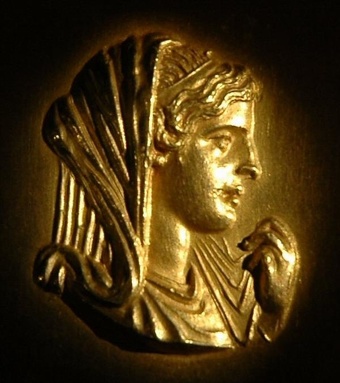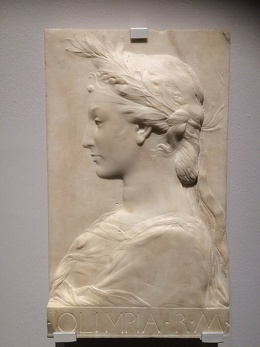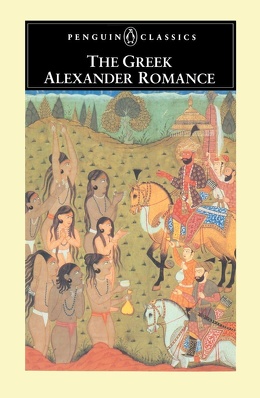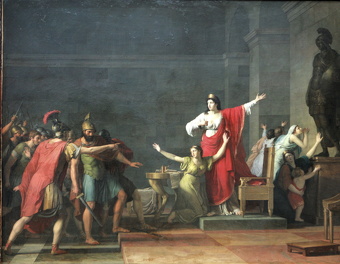Home | Category: Alexander the Great
OLYMPIAS
Olympias — Alexander the Great’s mother — was eldest daughter of Neoptolemus, king of Epirus, and the fourth wife of Philip II of Macedon. Her father claimed descent from Pyrrhus, son of Achilles. It is said that Philip fell in love with her in Samothrace, where they were both being initiated into the mysteries (Plutarch, Alexander, 2). The marriage took place in 359 B.C., shortly after Philip's accession, and Alexander was born in 356 B.C. She was extremely influential in Alexander's life and was recognized as de facto leader of Macedon during Alexander's conquests. [Source: Encyclopædia Britannica, 1911; Wikipedia]
Philip III Arrhidaios — Alexander the Great's half-brother and successor — and his young warrior-queen wife Eurydice, were respectively killed and forced to commit suicide by Olympias. Additionally, Cleopatra, Philip II's last wife was either killed or forced to commit suicide by Olympias. .According to the 1st century AD biographer Plutarch, Olympias was a devout member of a orgiastic snake-worshiping cult of Dionysus, and he suggested that she slept with snakes in her bed.
Stephanie Pappas wrote in Live Science: Regardless of whether Olympias was that diabolical, she certainly knew how to play politics — with bloody results.” After Philip II was killed, the queen moved quickly to put Alexander, on the throne. She arranged for Philip's two children by another wife, Cleopatra Eurydice, to be killed. Archaeologists who argue that a tomb at Vergina contains Philip II's bones have argued that the female remains found in the tomb belong to Cleopatra Eurydice. [Source: Stephanie Pappas, Live Science, June 11, 2015]
Elizabeth Carney wrote in National Geographic History: Olympias was the first woman to participate actively in the political events of the Greek peninsula. Olympias was murderous, vengeful, and brave — much like her male kin — but history has not treated her as grandly. The violence of her husband and son, both responsible for hundreds of thousands, perhaps millions of deaths, tends to be taken for granted — even celebrated — whereas both ancient and modern authors often fault Olympias, for not being nice. She wasn’t. But neither was Philip or Alexander. [Source: Elizabeth Carney, National Geographic History, December 4, 2019]
Most of the sources about Olympias, written many centuries after her death, treat her hostilely because she transgressed Greek expectations about women who were supposed to be quiet, passive, stay out of public life, and maintain the family. Olympias did none of those things. First-century A.D. Greek historian Plutarch wrote extensively about her, using her as a foil in his portrayal of Alexander. In Plutarch’s work, Alexander controls his passions (not something Alexander much did), where Olympias is driven by them, creating a somewhat biased but vivid portrait of this trailblazing Greek woman.
RECOMMENDED BOOKS:
“Olympias: Mother of Alexander the Great” by Elizabeth D. Carney (2006) Amazon.com;
“The Daughter of Neoptolemus : A Biography of Olympias, the Mother of Alexander the Great” by Michael A. Dimitri (1993) Amazon.com;
“Women and Monarchy in Macedonia” by Carney (2021) Amazon.com;
"The Young Alexander: The Making of Alexander the Great"
by Alex Rowson Amazon.com;
“Fire from Heaven” by Mary Renault (1969), Novel About Young Alexander, Amazon.com;
“Child of a Dream” by Valerio Massimo Manfredi (1998). Novel Amazon.com;
“Philip II of Macedonia: Greater Than Alexander” by Richard A. Gabriel, Illustrated, (2010) Amazon.com;
“Philip II of Macedonia” by Ian Worthington (2010) Amazon.com;
“By the Spear: Philip II, Alexander the Great, and the Rise and Fall of the Macedonian Empire” by Ian Worthington (2016) Amazon.com;
“Alexander the Great” by Philip Freeman (2011) Amazon.com;
“The Nature of Alexander” by Mary Renault (1975) Amazon.com;
“Alexander the Great: The Story of an Ancient Life” by Thomas R. Martin (2012) Amazon.com;
“Alexander the Great” by Paul Cartledge (2004) Amazon.com;
Family and Early Life of Olympias
Olympias was born in the northern kingdom of Molossia in the region of Epirus in the late 370s B.C. Situated in what is now northwestern Greece, Molossia was a remote place and was surrounded by mountains. It was greener, cooler, and more watered than central and southern Greece, and famous for its oracle of Zeus at Dodona. In the time of Alexander the Great, Philip II of Macedon and Olympias, most of the southern and central Greek peninsula was divided into city-states — some democracies and others ruled by aristocratic families. Molossia and Macedonia were governed by hereditary monarchies. [Source: Elizabeth Carney, National Geographic History, December 4, 2019]
Olympias’s father, Neoptolemus I, was king of the Molossians, an ancient Greek tribe in Epirus, and sister of Alexander I of Epirus. She also had a sister named Troas, who married their paternal uncle Arrybas of Epirus. Her family belonged to the Aeacidae, a well-respected family of Epirus. They took their name from the mythical king Aeacus, who ruled in the island of Aegina in the Saronic Gulf. The Aeacidae were perhaps the only Epirotes who were universally recognised as Greek. Olympias herself claimed direct descent from Helen of Sparta, mythologically the most beautiful woman in the world. Although unknown, some scholars have theorized that Olympias' mother may have been a Chaonian princess, based on the rumour that Olympias used to say that she was also a descendant of the Trojan prince, Helenus son of Priam (the last king of Troy) and Andromache, wife of Hector. [Source Wikipedia]
Olympias appears to have originally been named Polyxena. According to Plutarch she changed her name to Myrtale prior to her marriage to Philip II of Macedon as part of her initiation into an unknown mystery cult. The name Olympias was the third of four names by which she was known. She probably took it as a recognition of Philip's victory in the Olympic Games of 356 B.C. the news of which coincided with Alexander's birth (Plutarch, Alexander 3.8). Later she was named Stratonice, which was probably an epithet attached to Olympias following her victory over Eurydice in 317 B.C.
Olympias’ Marriage with Philip II
Olympias’s father, Neoptolemus, co-ruled with his brother Arybbas. When Neoptolemus I died in 360 B.C. Arybbas became the sole leader of the Molossians and Olympias’s guardian. In 358 B.C., Arybbas made a treaty with the new king of Macedonia, Philip II, and the Molossians became allies of the Macedonians.
The Molossians faced a threat from the Illyrians to the north. A marriage alliance with Macedonia would help both kingdoms. The Illyrians had invaded Macedonia and killed Philip II’s brother, Perdiccas III, along with 4,000 other Macedonians. To take the throne Philip had to defeat the Illyrians and several claimants to the throne. [Source: Elizabeth Carney, National Geographic History, December 4, 2019]
Philip was 23 when he became king in 359 B.C. Olympias and her uncle Arybbas traveled to the distant island of Samothrace (off the coast of Macedonia), apparently to arrange her engagement to Philip II, king of Macedonia. Philip is said to have fallen in love with Olympias when both were initiated into the mysteries of Cabeiri at the Sanctuary of the Great Gods Samothrace, though their marriage was largely political in nature and took place to seal the alliance between Macedonia and Epirus.
Quintus Curtius Rufus wrote: After all these things being brought to pass, he took to wed Olympias, one of the Daughters of Neoptolemus, King of the Molossi. This Marriage was concluded by the means of Arisba, who had the Government of Olympias, and not long before had married her other Sister Troas. This Marriage, which he intended for his security, turn'd afterwards to his subversion; for thinking to have made himself strong by the affinity of Philip, he was at last by him deprived of the whole Kingdom, and ended his life miserably in Exile. [Source: Quintus Curtius Rufus (Roman historian, probably A.D.1st century), “The Life and Death of Alexander the Great, King of Macedon,” translated by Robert Codrington (1602-1665), University of Michigan, Oxford University, 2007-10 quod.lib.umich.edu/]
Not long after this Marriage, King Philip dreamed, that he saw an excellent Medal fastened to the Womb of his Wife; and to his seeming, the lively Image of a Lyon thereupon: By which Dream the Divines did interpret, that his Wife was conceived of a Childe that should be of a Lyons heart and courage; which interpretation pleased him highly. Afterwards, at the assault of a City called Methron, by shot of an Arrow he lost his right eye; whereof though the displeasure was great, yet was he content, upon their submission, to take them to mercy. He won also the City of Pagus, and annexed the same unto his Kingdom: He invaded the Land of the Tribals, and at one instant conquered it, with all the Countries thereabout.
Olympias’s Prestige Rises After She Gives Birth to Alexander the Great
Olympias’s marriage to Philip made Olympias the queen consort of Macedonia. Elizabeth Carney wrote in National Geographic History: By 357 B.C. Olympias had arrived in Pella (Philip’s primary residence) and married him, thus becoming one of his seven wives. Macedonian kings were typically polygamous, but Philip’s polygamy was on a grander scale, employed to unify his kingdom and expand his territory.[Source: Elizabeth Carney, National Geographic History, December 4, 2019]
In 356 B.C., Olympias gave birth to her son Alexander; a year or two later, her daughter Cleopatra. Philip had only one other son (later known as Philip III Arrhidaeus) by another wife, and it became apparent that he was mentally disabled. Alexander appeared to be the likely heir, which made Olympias the most prestigious of Philip’s wives (there was no formalized chief wife). Since kings could have many sons and no formal rules for succession seem to have existed, mothers tended to become succession advocates for their sons, and Olympias became that for hers.
Quintus Curtius Rufus wrote: Thus having made his Kingdom strong by subduing his Neighbours, at his return home his Wife Olympias was delivered of his Son Alexander, on the eighth of the Ides of April. Of these good fortunes the King rejoyced no less then reason was, having established his Country at home, subdued his enemies abroad, and gotten an Heir to succeed him in his Kingdom: he could have desired no more of God, if the minde of man could ever be satisfied, which the more it hath, the more it coveteth. [Source: Quintus Curtius Rufus (Roman historian, probably A.D.1st century), “The Life and Death of Alexander the Great, King of Macedon,” translated by Robert Codrington (1602-1665), University of Michigan, Oxford University, 2007-10 quod.lib.umich.edu/]
Olympias was not the only Molossian at the Macedonian court: Several relatives, including her brother (the future Alexander I of Molossia) soon arrived. This Molossian Alexander remained at court for a number of years. About 343 B.C., Philip forced Arybbas into exile to put Olympias’s brother on the Molossian throne. This move was a logical development of the alliance that had begun years before, not necessarily a demonstration of Olympias’s influence with her husband, but it did increase her prestige. Olympias remained close to her Molossian roots the rest of her life.
Olympias’s Estrangement From Philip II and Upbringing of Alexander the Great
The fickleness of Philip and the jealous temper of Olympias led to a growing estrangement, which became complete when Philip married a new wife, Cleopatra, in 337 B.C. Alexander, who sided with his mother, withdrew, along with her, into Epirus, whence they both returned in the following year, after the assassination of Philip, which Olympias is said to have countenanced. [Source: Encyclopædia Britannica, 1911]
Elizabeth Carney wrote in National Geographic History: Since Philip was frequently absent on campaign, Olympias took on a greater role in raising her son, who probably knew his mother better than his father. Plutarch described Alexander’s relationship with Philip as competitive but affectionate. [Source: Elizabeth Carney, National Geographic History, December 4, 2019]
Yet the apparent security and prestige of Olympias and Alexander suddenly seemed to vanish on the occasion of Philip’s seventh marriage to a Macedonian woman, Cleopatra Eurydice. Philip had married many times, so yet another marriage was not necessarily a problem for Alexander (he was apparently invited to the wedding festivities), but this was Philip’s first marriage to a Macedonian woman, one with an ambitious guardian. It was another marriage alliance, this time
At the wedding, the wine flowed freely for Philip and his guests. The uncle and guardian of the bride, a Macedonian general named Attalus, asked those assembled to join him in a toast that the new marriage might bring to birth a legitimate successor. Alexander sprang up enraged, demanded to know if Attalus was calling him a bastard, and threw a cup at him. Philip attempted to draw his sword on his own son and failed because he was so drunk he tripped, and Alexander mocked him. After this drunken brawl, Olympias and Alexander went back to Molossia. Exactly what the drunken Attalus meant by his insult is unclear: He could have been charging Olympias with adultery or insinuating that Alexander, the son of a foreign woman, was therefore not legitimate.
Philip did mend fences, and Alexander and his mother returned to Macedonia. Philip planned a wedding extravaganza celebrating the marriage of Olympias’s daughter, Cleopatra, to her uncle and Olympias’s brother, the king of Molossia. The union was meant to reassure Olympias and her family and convince the Greek world generally that Philip’s planned military invasion of Persia could proceed without more domestic upset. At this moment of apparent reconciliation, Philip was suddenly assassinated by a young Macedonian noble and former lover, Pausanias.
See Separate Article: PHILIP II (ALEXANDER THE GREAT’S FATHER): HIS LIFE, LOVES, MURDER AND RISE OF MACEDON europe.factsanddetails.com
Olympias in the Alexander Romance
The Alexander Romance has been described as "antiquity's most successful novel", It is an account of the life and adventures of Alexander the Great. The Romance describes Alexander the Great from his birth, to his succession of the throne of Macedon, his conquests and his death. Although constructed around an historical core, the romance is mostly fantastical, including many miraculous tales and encounters with mythical creatures such as sirens or centaurs. [Source Wikipedia]
Elizabeth Carney wrote in National Geographic History: Tales of Olympias and Alexander took on new life in a legend known as the Alexander romance, whose plots bewitched its medieval audience. Based on a second-century A.D. Greek text, versions spread through European and Middle Eastern cultures. In one version, Olympias is not impregnated by Zeus. She is tricked and seduced by an Egyptian pharaoh and sorcerer, Nectanebo. [Source: Elizabeth Carney, National Geographic History, December 4, 2019]
Nectanebo tells Olympias that the god Ammon-Zeus will appear in her bedchamber, but the man who impregnates her is Nectanebo himself. Philip, who was away at war, returns home to discover his wife is pregnant. While the couple are attending a banquet, Nectanebo, in the guise of a dragon, and kisses her hand. Philip is convinced that his child has been fathered by a god.
During Olympias’s labor, Nectanebo predicts the child will be a world conqueror. The sorcerer stays on at court, until Alexander tries to kill him. Before he dies, Nectanebo confesses his relationship to the boy. Alexander, remorseful at having killed his father, recounts the story to Olympias, who now discovers the sorcerer’s trick.
Olympias During Alexander the Great’s March of Conquest
After Philip II was assassinated Alexander quickly eliminated all Macedonian rivals and defeated all Greek attempts to overthrow Macedonian dominance. He had Attalus killed, and Olympias — with or without Alexander’s knowledge — had Philip’s new wife and baby killed. In 334 Alexander led a combined Greek and Macedonian force to Asia, leaving the general Antipater behind in apparent control of the Greek peninsula. Olympias remained in Macedonia and Alexander’s sister Cleopatra, still married to her uncle, resided in Molossia. During the absence of Alexander, with whom she regularly corresponded on public as well as domestic affairs, she had great influence, and by her arrogance and ambition caused such trouble to the regent Antipater that on Alexander's death in 323 B.C. she found it prudent to withdraw into Epirus. [Source: Encyclopædia Britannica, 1911]
Elizabeth Carney wrote in National Geographic History: As Alexander’s victories accumulated, Alexander sent plunder home to Olympias, and she made splendid dedications in his honor at Delphi and Athens. Tradition says that she offered advice to her son while he was away and warned him of threats. Chief among those was Antipater. (For centuries, the Oracle at Delphi attracted the powerful who sought answers from the gods). [Source: Elizabeth Carney, National Geographic History, December 4, 2019]
Antipater, meanwhile, was also complaining to Alexander, with equal vehemence, about Olympias. Each seems to have thought that the other was overstepping their position. Ancient authors describe Olympias as difficult and assertive and insist that Alexander tolerated his mother but did not let her affect policy. At least not at first; toward the end of his reign it was different. By 330 B.C. quarrels with Antipater forced Olympias to retreat to Molossia. Olympias was a grandmother now: Her daughter Cleopatra had borne a son and daughter. Around 334 B.C. Cleopatra’s husband left for a military expedition to Italy and died there. Cleopatra served as guardian and probably as regent for her young son, possibly sharing power with Olympias.
Meanwhile, Antipater’s relationship with Alexander deteriorated, and by 325, after Alexander’s return from India, rebellion began to spread in Alexander’s realms. Seizing the moment, Olympias and Cleopatra formed a faction against Antipater. Plutarch claimed that they divided rule between them, with Olympias taking Epirus, and Cleopatra Macedonia, but the true details of this arrangement remain unclear.
According to Plutarch, Alexander congratulated his mother on having made the better choice since the Macedonians would never endure being ruled by a woman. Not long after, Alexander ordered Antipater to turn his position over and meet him in Babylon. When, months later in June 323, Alexander died in Babylon, Antipater was still in his old position, though several of his sons, including Alexander’s cupbearer, were with Alexander. His sudden death made many, including Olympias, suspect that Antipater’s family had poisoned him. Historians doubt that Alexander was murdered, but as with the death of Philip, little can be certain.
Olympias After Alexander the Great’s Death
After Alexander the Great’s death in 323 B.C., Olympias remained in Epirus until 317, when, allying herself with Polyperchon, by whom her old enemy had been succeeded in 319, she took the field with an Epirote army; the opposing troops at once declared in her favour, and for a short period Olympias was mistress of Macedonia. [Source: Encyclopædia Britannica, 1911]
Elizabeth Carney wrote in National Geographic History: The death of her son left Olympias in a precarious position. Alexander left behind no obvious heir. It was decided that the unborn child of Roxanne, one of Alexander’s wives, would co-rule with Alexander’s half brother, the mentally disabled Philip III Arrhidaeus, and a regent would be appointed. Roxanne gave birth to a boy, Alexander IV, but succession would be anything but smooth. [Source: Elizabeth Carney, National Geographic History, December 4, 2019]
Alexander’s generals, “the successors,” fought fiercely among themselves to establish control over the empire. They broke into competing factions, each one controlling a different region. Antipater managed to hold on to Macedonia, and Olympias kept a safe distance in Molossia. Without Alexander, Olympias needed military protection from her family. Aeacides, Olympias’s nephew, seems to have become co-king with Alexander IV, Olympias’s young grandson, around this time.
Antipater died in 319, and the new regent, Polyperchon, urged Olympias to return to Macedonia to care for her grandson Alexander IV. Antipater had passed over his own son, Cassander, and named Polyperchon as his successor. The two men were at odds, and Polyperchon knew an alliance with Olympias could be useful. She refused for several years, not trusting any of the successors, but relented out of fear that Philip III Arrhidaeus and his Argead wife, Adea Eurydice (allies with Cassander), would kill Alexander IV.
Classical authors wrote about Olympias in the context of her famous son rather than as a figure in her own right. Among the best known of these histories is Plutarch’s second-century biography of Alexander, which typifies the distaste that men of the period held for women who stepped outside their roles as mothers and wives. Olympias stirs up discontent in Philip’s household, Plutarch wrote, because she was “a jealous and sullen woman,” whom men have reason to fear. Plutarch wrote that, although Olympias did not kill Philip II, she helped stir up his assassin. Modern historians concede that Olympias did kill Philip’s new bride, but they recognize the act was no more ruthlessly pragmatic than those committed by the men around her, including her son.
War Between Women and Olympias’s Demise and Legacy
Cassander tried to gain power in Macedonia and sought to kill or kidnap Alexander's son and wife, according to ancient historical records. Forces loyal to Olympias tried to defeat Cassander, Cassander, who rushed from the Peloponnesus to Macedonia and laid siege to Pydna, where Olympias had taken refuge. Her supporters were forced to surrender after they ran out of food. One of the terms of the capitulation had been that her life should be spared; but in spite of this she was brought to trial for the numerous and cruel executions of which she had been guilty during her short lease of power. Condemned without a hearing, she was put to death in 316 B.C. by the friends of those whom she had slain, and Cassander is said to have denied her remains the rites of burial. [Source: Encyclopædia Britannica, 1911; Owen Jarus, Live Science, July 21, 2021]
Elizabeth Carney wrote in National Geographic History: In fall of 317, Olympias appeared in Macedonia at the head of an army with Polyperchon and her nephew Aeacides, and Adea Eurydice met her with her forces: Greek historian Duris of Samos called it the first war between women. Supposedly Olympias dressed as a Bacchant, and when the Macedonian army saw her, it threw its support to her. She killed Philip and Adea Eurydice, as well as a number of supporters of Cassander, a local official and Antipater's son who tried to seize power in Macedonia. [Source: Elizabeth Carney, National Geographic History, December 4, 2019]
Olympias’s success did not last because Polyperchon proved a bad general and Cassander an excellent one. His victories eroded public support for Olympias and Alexander IV. Cassander besieged Olympias at Pydna, as we said before and Olympias was executed. Olympias went to her death with courage. The Argead dynasty, for practical purposes, ended with her death, although Cassander waited a few years before he murdered Alexander IV.
Standing at the beginning of a long line of powerful women, Olympias set a precedent for women in Hellenistic monarchies: It became almost the norm for women to appear with armies, co-rule, and engage in fierce succession battles. Cleopatra III of Egypt co-ruled with one son, expelled him and co-ruled with another, who subsequently murdered her in 101 B.C. Cleopatra VII (the Great) fought two of her brothers, secured the throne of Egypt for herself, and lost it to Rome in 30 B.C. — ending the line that started with Olympias centuries before.
Researcher Says He’s Located Olympias’s Tomb — Experts Are Skeptical
In July 2021, a researcher 22 that he had identified the long-lost tomb of Olympias but other scholars are doubtful that it's really her burial. Owen Jarus wrote in Live Science: Archaeologists first discovered the tomb in 1850, not far from the Greek archaeological site of Pydna. The tomb has been studied at times by archaeologists since then. Recently, Athanasios Bintas, an emeritus professor of Greek studies at the University of Niš in Serbia, examined the tomb and now says it was used to bury Olympias. Made of stone, the tomb is 72 feet (22 meters) long and contains multiple chambers. The tomb's design has led archaeologists to date it to the late fourth to early third century B.C. As the tomb was robbed in ancient times, no bodies or grave goods have been found inside.[Source Owen Jarus, Live Science, July 21, 2021]
Though historical sources say that Cassander did not allow Olympias a proper burial, Bintas stands by his claim that her remains were interred in this elaborate stone tomb. "A dead queen was no longer dangerous for Cassander," Bintas told Live Science. The tomb was likely a more modest structure at the time of burial; but in 288 B.C. when Olympias' nephew Pyrrhus became king of Macedonia, he expanded her tomb.
The tomb's large size, its age and its proximity to Pydna (where Olympias was defeated) all support the claim that it was Olympias' tomb, Bintas said. Inscriptions found not far from the tomb contain lines that appear to mention Olympias' tomb, suggesting that it is likely nearby, he said. The inscriptions were described by the scholar Charles Edson in 1949 in the journal Hesperia and are now lost. Bintas has not yet published his arguments in an academic journal.
Five scholars not affiliated with the research were either skeptical about the claim or wanted more information on Bintas' research before putting forward their opinion. "It is far too soon to say [whether this is the tomb of Olympias], especially on the basis of so little specific evidence," said Elizabeth Carney, a professor of humanities at Clemson University, in South Carolina, who has conducted extensive research on Olympias.
Ian Worthington, a professor of ancient history at Macquarie University in Sydney, Australia, expressed doubts that this is the tomb of Olympias. Ancient sources, Worthington noted, were clear that Cassander did not allow Olympias a proper burial; and since Cassander was afraid of rebellions, he would have barred such a tomb that could be used to rally Cassander's opponents. By the time Cassander died in 297 B.C., almost 20 years had passed since Olympias' death; Worthington said he doubts that someone would go to the trouble of building an elaborate tomb by that point.
Additionally, Worthington notes that just because the tomb is large does not mean that whoever was buried in it was noble. In fact, he said, a large tomb could be had by anyone with enough wealth to build it. "You could be wealthy but not necessarily noble," said Worthington. Another problem is that Olympias was originally from Epirus, in northwestern Greece. If someone wanted to give her a proper burial, Worthington thinks that it's more likely they would have brought her home to Epirus rather than bury her close to where she was killed.
Image Sources: Wikimedia Commons
Text Sources: Internet Ancient History Sourcebook: Greece sourcebooks.fordham.edu ; Internet Ancient History Sourcebook: Hellenistic World sourcebooks.fordham.edu ; BBC Ancient Greeks bbc.co.uk/history/; Canadian Museum of History, Perseus Project - Tufts University; perseus.tufts.edu ; MIT Classics Online classics.mit.edu ; Gutenberg.org, Metropolitan Museum of Art, National Geographic, Smithsonian magazine, New York Times, Washington Post, Live Science, Discover magazine, Natural History magazine, Archaeology magazine, The New Yorker, Encyclopædia Britannica, "The Discoverers" and "The Creators" by Daniel Boorstin. "Greek and Roman Life" by Ian Jenkins from the British Museum, Wikipedia, Reuters, Associated Press, The Guardian, AFP and various books and other publications.
Last updated September 2024






